
THE VOICE OF INTERNATIONAL LITHUANIA
|
VilNews has its own Google archive! Type a word in the above search box to find any article.
You can also follow us on Facebook. We have two different pages. Click to open and join.
|
Archive for July, 2011
What has Mikhail Golovatov done after 1991?
- Posted by - (0) Comment
![]()

Mikhail Golovatov was in the 1990s founding Russia’s ‘security company Alpha-B and the consulting company Consult TP, where most of the employees are retired KGB officers
On their website they claim to have: “Highly qualified Security Professionals
Very Effective at Interacting with Russian Official Bodies
- State Duma
- Chamber of Commerce and Industry
- Other Governmental Institutions.”
The private Security Company Alpha-B was created and officially registered in 1993. The founder of the company was Mikhail Golovatov, the former officer of the Soviet anti-terrorist group Force "Alpha" (Group "A").
Cities where Alpha-B officially operates:
Moscow, Saint-Petersburg, Prague,
Goudermes, Tbilissi, Juzhno-Sakhalinsk
Atherau, London, Helsinki, Grozny
- Bookmark :
- Digg
- del.icio.us
- Stumbleupon
- Redit it
Bypass to the Baltics
- Posted by - (0) Comment
![]()
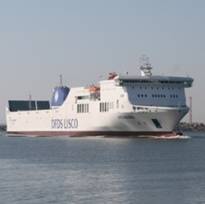
Lithuania and its sister republics, Latvia and Estonia, have always been difficult targets for holidaying motorists, not least because the road quality deteriorates the further east you go, and there's an impasse in the shape of Russia's enclave of Kaliningrad. But DFDS Baltic ferries (0871 522 9978; dfds.co.uk/Baltic) between Kiel in northern Germany and Klaipeda in Lithuania offer a fast track that also provides a 21-hour cruise. Typical return fares for a car and four people, and accommodation, is £800 (EUR 1,000) in August.
Source:
http://www.independent.co.uk
- Bookmark :
- Digg
- del.icio.us
- Stumbleupon
- Redit it
New, direct freighter service China – Kaunas
- Posted by - (0) Comment
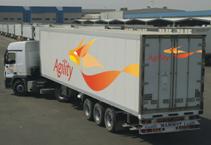
Agility, a leading global logistics provider, has introduced a scheduled freighter service that will directly connect key origins in China via Shanghai to Kaunas, Lithuania.
With few freight options that cover this routing, the new service delivers stable and faster access, helping customers move goods from China into the rapidly growing markets of Northern Europe, the Nordics, Russia and the Baltics.
The freighter has a capacity of 107 tons and will initially operate on a weekly basis, said.
Space is guaranteed. The new service allows Agility’s customers faster access to these markets with its Air Freight “Expedited” and “Premier” products on the route with reduced transit times of between one and four days, depending on destination.
The service forms part of a comprehensive logistics offering featuring additional supply chain solutions: pick-up and warehousing in China, customs clearance in Kaunas and warehousing in Lithuania.
Together with its partner in Lithuania, Hoptrans, Agility provides freight forwarding over land from Kaunas to a wide range of onward destinations including all major cities in the region.
At the destination, customer options will include customs clearance, warehousing in bonded and non-bonded facilities.
With a departure on Saturday morning from Shanghai and customs cut-off on Friday morning, this new service allows customers to load their cargo for delivery over the weekend, with many destinations receiving cargo on Monday.
“Northern Europe, the Nordics, Russia and the Baltics all show increasing demand for air freight,” said Michael Blaufuss, Agility’s Senior vice president of Air Freight.
“With our own freighter service, we are now uniquely positioned to offer end-to-end supply chain solutions that offer reliability and speed on these important trade routes.”
John Klompers, Agility’s chief commercial officer said the new service underlines Agility’s commitment to its customers in fast developing markets.
'This service will help them build robust and reliable transportation links that in turn connect their customers and operations around the world,' he added.
Source:
http://www.tradearabia.com
- Bookmark :
- Digg
- del.icio.us
- Stumbleupon
- Redit it
- Posted by - (6) Comment
KLAIPĖDA MAYOR:
Klaipėda aims to become
an Eastern European
avant-garde city
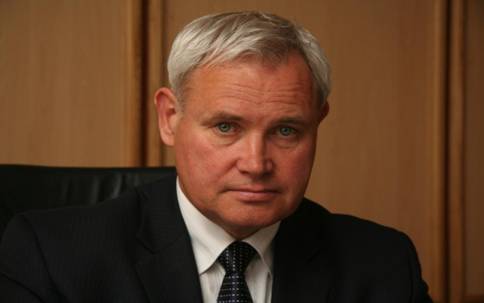
Mayor of Klaipeda, Vytautas Grubliauskas
The Mayor of Klaipeda interviewed by Aage Myhre
aage.myhre@VilNews.com
Congratulations with the post as Mayor of Klaipeda! Anything you can share with our readers about the municipal and mayor elections where the outcome was that you took over Klaipeda's main chair this spring?
Thank you. Klaipėda was always a stable and trustful city. Recent elections proved that those adjectives are true. Democratic transition in Kaunas and Vilnius was indecisive until last night or even during the mayoral voting session. Meanwhile here in Klaipeda a prospective coalition started work planning for a 4 year term already after the municipal election night. This stability brings a lot more clarity for citizens and administration.
What can you tell our readers about today's situation and the outlooks for the economy of Klaipeda?
Recession in Klaipeda lasted much shorter than in other cities. Thus it's still present in real estate sector, we bounced quickly back in other sectors. We kept quite stable consumer demand due to Klaipeda's large workforce share (appr. 40%) employed in harbour related activities that hardly experienced recession. Positive economical outlook for local companies continued city economy running in difficult times. For future, I see much unused capacity in harbour and free economical zone activities that are already best performers in whole Baltics. On the other hand I watch with uncertainty demographic decline as most difficult macroeconomic challenge for municipal budget and consumer demand. We have to cope with a shrinking city scenario.
Klaipedos Nafta is in the process of building the first LNG import terminal on the Eastern Baltic coast, for use in Lithuania and potentially for export to its Baltic region neighbours. Lithuania intends to become one of the first European countries to implement the European Union's Third Package of energy market reforms, which would result in the creation of a free and open energy market similar to what now exists in the U.S. The development of the Klaipeda LNG terminal is said to be a critical component in the plan to open the energy markets in the Baltic region. What can you say about these plans?
Klaipėda is a logistical gateway for East-West corridor, therefore our participation is self-evident. The planned LNG terminal has become a national geopolitical priority and our city will help to install it. Meanwhile as a citizen and mayor I understand the potential hazards. Although we would like to apply so called NIMBY rule (‘Not In My Back Yard’) for necessary but unwanted infrastructural objects, Klaipėda will welcome this terminal and get full package of security precautions and decent compensation for it. That’s the demand from the city.
There have been plans to create ‘a waterfront oasis’ at the territory that till now has been part of Klaipeda’s port area, on both sides of the river Dane estuary. The project was showing a better connection between Klaipeda Old Town, the cruise ship port and the Baltic Sea – for multifunctional purposes with shops, offices, apartments and green outdoor areas in direct contact with the sea. What is the stage of this project now?
Eventual projects have a symbolic meaning. They are first public access points to lagoon in former access forbidden harbour. At the same time, we hope this brownfield investment will encourage other infill developments. Yet, both waterfront projects are in post recession phase with real estate sector specific issues. The supply of such quality locations is unique in Klaipėda, therefore I hope these projects will jumpstart very soon. This will introduce totally new centrality for Klaipėda.
“Klaipeda faces difficulties in attracting cruise vessels, loses to Riga and Tallinn.” These have been headlines in local newspapers this spring. Is that true and what can in case you and the Klaipeda port authorities do about it?
Yes indeed, there is a small decline for cruise vessels this year. But very proactive discount schemes, introduced by Ministry of Transport in early winter, allow me to interpret this decline more as a prolonged recession in cruise business rather than our wrong policy. At the same time, although Klaipėda is really striving to become Lithuanian Barcelona or Miami, our size and brand is weaker than neighboring capital cities Riga and Talinn.
“Lithuanian tourism sector is haunted by poor leadership.” This said a VilNews writer in an article recently (https://vilnews.com/?p=5217).Are you planning to do something about the situation, and to make the tourism sector in your region more organised and more attractive for visitors?
Already during my first month as a mayor I organized meeting with mayors of 6 neighbour regions in order to discuss common strategy to revive tourism in Western Lithuania. The first and foremost goal is to bring new flight directions to Palanga-Klaipėda airport. We also agreed to brand the region as one unit instead of fragmented marketing. Already this summer we bring all summer events in Klaipėda under one unified advertisement campaign.
A new, extended activity field for our VilNews e-magazine, is to invite groups of people with some sort of interest in Lithuania to travel here on so-called theme-tours. We are in the process of preparing a trip for a group with interest in traditional Lithuanian food (https://vilnews.com/?p=5176), another one for people with interest in the very interesting connections between India and Lithuania (https://vilnews.com/?p=4425) , and a third one for readers of Ruta Sepetys’ bestselling novel “Between shades of gray” (https://vilnews.com/?p=2197) to come here and see and learn more about the Siberia deportations from Lithuania during WWII. Would you and the Klaipeda Municipality be interested in a cooperation?
Of course, any idea is worth to be supported. As a jazz singer I am most fond of jazz tours, which from time to time I could even guide myself. Lithuania and Klaipėda has much to offer.
One of the biggest problems that Lithuania faces today is violence against women. Statistics claims that 63% of all women in Lithuania suffered from physical and/or psychological violence, whereas world average is 33%. I have been told that Klaipeda municipality wants to be a pioneer-municipality in terms of focus on domestic violence and abuse of women. Your city has for years had a women's shelter for women, but has now taken a huge step forward and is already well underway with the planning of what is probably going to be Lithuania's most modern and advanced crisis centre for women, expected ready built in early 2012 (ref. https://vilnews.com/?p=3571). How do you see that Klaipeda can be a good example for other Lithuanian municipalities with regards to this very severe problem?
Thanks to funds from Espersen Foundation, Klaipėda becomes a pioneer in this social blind spot. What we will see with rise of this building is not a problem solution, only a shelter for severe societal problems. Although the shelter is extremely needed, Klaipėda will never be an example if violence will persist. Therefore I see immediate need for social evolution towards extermination of violence against women in general. For that we need awareness campaigns and education from early school age. Only with such package of measures I will be able to call Klaipėda as good example for other municipalities.
The Klaipeda city court has acquitted a group of ‘history enthusiasts’ for using posters with swastikas on them during the Independence Day parade on 16 February in Klaipeda. The court on 18 May ruled to terminate the administrative case against the four youth on grounds that the Swastikas used on the posters were photographs of an archaeological finding in Lithuania and initially the swastika was the sign of the sun. “These are not Nazi symbols, but valuable symbols of the Baltic culture. The symbols of our forefathers, which were taken away, fabricated and crippled by other nations. It is not fascism, but the architecture of the universe that they represent,” Milvydas Jusakauskas, the defence counsel’s witness from Vilnius said after the court hearing. What are your comments to this?
Comments on court decisions exert political pressure and I will avoid it. But despite this legal case, I want to cheer readers of “VilNews” that Klaipėda has not had any serious racially or ethnically biased criminal actions towards non-Lithuanian guests for years. Nor do I have information about neo-nazis or gangs operating in town. On opposite, Klaipėda has very peaceful community life.
Lawmakers in Lithuania's Committee on Legal Affairs, under the leadership of MP Petras Gražulis, voted recently to make even more stringent censorship legislation against homosexuals in this country, saying that they should be able to fine people for the "propagation of homosexual relations" in public. This has earned condemnation from EU groups who say this is just another step in furthering an ultra conservative agenda in Lithuania. How gay hostile can Lithuania become before someone starts appealing to normal common sense?
Opposite to any former mayors of Vilnius and Petras Gražulis himself, Klaipėda, and I personally, welcomes gay prides and gay communities. The whole idea of censorship is based on ridiculous logics, as psychologist O. Tapinas said once correctly “if you observe birds for a while you will become bird yourself”. I think we are talking about so called “10% society” and the rest 90% can’t be “persuaded” into homosexuality. Denial will only increase frustration in society.
I have heard said that if Lithuania’s politicians and bureaucrats were half as interested in the country they are supposed to serve as in their own pockets, this would already have been a fine, prosperous country. Fraud, corruption, briberies, lack of teamwork and transparency have all too often become terms used while describing the way Lithuania is managed. Do you have any clean-up plans ready?
Clear bureaucratic rules, short deadlines, e-government, well managed outsourced functions and motivated workforce is a key to more transparent municipal services. I see lots of space for improvement in Klaipėda. Biggest expectations I have towards introduction of electronic tender system and HR department.
Finally, please let our huge, international VilNews readership know what are your visions and plans for Klaipeda and the Baltic Sea region over the years to come?
I will strive for Klaipėda to become an Eastern European avant-garde city in life quality and culture. For many years we had wrong priorities. Now it is time for pure living and jazzy souls.
Greeting to sister cities by mayor of Klaipėda Vytautas Grubliauskas.
- Bookmark :
- Digg
- del.icio.us
- Stumbleupon
- Redit it
- Posted by - (3) Comment

Radisson Blu Hotel, Klaipėda:
Retreat to elegant
seacoast luxury!
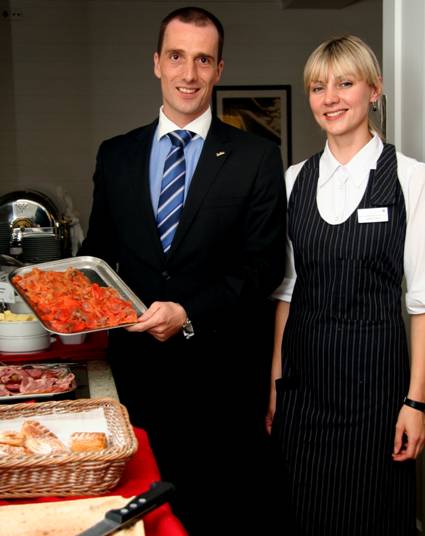
General Manager Tobias Ammon is rightly proud of the breakfast buffet that
Radisson Blu Hotel offers its guests. Here with waitress Kristina.
The Radisson Blu Hotel in Klaipeda has just celebrated its first ten years as the only truly international luxury hotel at Lithuania’s beautiful seacoast. Two months ago the hotel got a new General Manager, German Tobias Ammon (35), and I am sitting down with him in the hotel’s breakfast room this early July morning to let him explain to you, dear readers, why you should visit Klaipeda and his hotel – this summer as well as when the autumn winds already make the endless Baltic Sea waves powerfully roll in towards the port city shores.
“I must admit that I had to ask where Klaipeda is when I was offered this position, but I was astonished to see what a nice area this is, when I first came here,” tells the young manager, who now has moved here with wife and little daughter. He and his little family are now in full swing “testing Klaipeda as travel destination”, and they are using their bicycles to do exactly that!
“This area is really ideal for bikes, and we are now using our weekends to bike to the fantastic beaches in the outskirts of the city, riding through beautiful coastal pine tree forests, villages and over the wavy, green landscapes that characterise this area,” he tells.
To my question why people should come to visit this seaside town and district, Tobias answers: “First of all because of the experience. Klaipeda is still kind of a genuine, untouched place, and there is a lot to discover for those who haven’t been to this part of Lithuania or Europe. The genuine Old Town in Hanseatic style, the river, the yacht harbour, the beautiful nature, the smell of sea, combined with a long and interesting history starting in the 13th Century. In addition, Klaipeda is centrally located between the resort areas of Neringa and Palanga, The ferryboat trip over to Neringa (the Curonian Spit) takes only a few minutes. The Palanga resort town and international airport is only a 20 minutes drive from here. So this is really an ideal, central location for those who want to experience the beautiful Lithuanian seashores.”
“I agree that the summers in Lithuania are nothing but fantastic. The long, white, soft and sandy beaches that surround Klaipeda both to the north and west makes this a truly ideal summer paradise, but what about the autumn, winter and spring seasons out here at the coast? What can you offer our VilNews readers when this area again turns rainy or snowy and the icy Baltic Sea winds are whipping the faces of all those walking around in bowed positions to avoid being blown over?” I ask.
“Let me first say that our hotel has several corporate clients, many representing companies and organizations dealing with the Klaipeda harbour, shipyards or other sea related activities. They represent our core business. But let me also say that I am eager to get in touch with companies or organisations considering a seacoast seminar or conference. We can accommodate up to 100 delegates in our meeting rooms and we have 74 elegant guest rooms with all you expect from a branded high class hotel.” Tobias sounds very convincing when he describes all the advantages of the hotel and of Klaipeda as conference destination even during the colder seasons.
“What about weekend offers for people living in the Lithuanian inland cities or in other European countries?”
“Our hotel can offer excellent weekend packages for individuals and families. Just call us! In addition to the 74 rooms we also have fitness facilities and a steam bath. We have rooms for entertainment or meetings, a well assorted bar, and a restaurant that is famous for its delicious meals for all tastes and desires.
So why not follow his advice and go for a seaside experience next time you plan for a seminar or a team-building event in your company or organisation? Or simply for some days off, deeply breathing the refreshing sea air out here...
Palanga International Airport has direct flights from Copenhagen, Oslo, Riga and Moscow. There are ferries connecting Klaipeda with Sweden and Germany. Or you can come by train, bus or your own car. The excellent motorway between Vilnius and Klaipeda makes the 300 km trip a pleasant three-hour experience only...
To talk with Tobias Ammon feels very refreshing. One can easily feel that this is a gentleman full of ideas and energy that surely will be for the benefit of Klaipeda and the Radisson Blu hotel.
But despite his rather young age, Tobias is a man with a very impressive record of experience. Born in Germany, not far from Berlin, growing up in the seaside city of Rostock, moving to the Black Forest area to start in the hotel business already as a 20-year youngster, and since then learning the trade and ‘climbing the ladder’ in several German hotels, as well as in Austria, England and St. Petersburg, Russia, before coming to Klaipeda as General Manager of Radisson Blu.
“Already as a child I loved to entertain, make shows, prepare dinners and so on. For my parents and others. So it was probably not strange that I chose the hotel business, first of all within the so-called ‘food and beverage’ segment of the business.”
“I simply love to meet people,” he declares as his conclusion to our little chat at the hotel’s breakfast table this morning.
Text: Aage Myhre
aage.myhre@VilNews.com
|
|
|
|
|
|
- Bookmark :
- Digg
- del.icio.us
- Stumbleupon
- Redit it
- Posted by - (0) Comment
Latvian MEP Karins:
The LNG terminal will be built in Riga
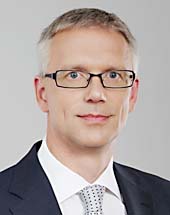
Krisjanis Karins.
European Commission (EC) will support construction of the liquefied natural gas terminal only in Riga, whereas it will refuse to fund the construction of the terminal in Klaipeda or Ventpils, Krisjanis Karins, a Member of the European
Parliament, said in an interview on Latvian "Rietumu Radio".
When asked to comment on the discussion about the location of the terminal, Karins admitted that it is all about politics. Lithuania, for example, sustains the discussion only because it relates to its constituency. "Lithuania is even more dependent on Russian gas, and their voters demand immediate solutions. That is why they are so active," said Karins, adding that Lithuania will not solve anything without the help of Latvia.
Read the complete article at:
http://www.baltic-course.com/eng/energy/?doc=42975
- Bookmark :
- Digg
- del.icio.us
- Stumbleupon
- Redit it
![]()
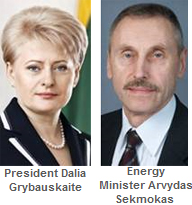
"The Government of Lithuania on Wednesday gave the projected liquefied natural gas (LNG) terminal in Klaipeda the status of national importance. The Cabinet approved the implementation plan of the LNG terminal project which provided for coordination and speedy work of all the institutions involved in the project.
It will force other departments to be more active in solving the issues related to land plots, EIA assessment and the involvement of the sea port in the project. The status stresses the importance of the project and obligates all the departments to accelerate it," Energy Minister Arvydas Sekmokas said after Government meeting Wednesday.
President Dalia Grybauskaite earlier criticised the slow pace of the LNG terminal project. "I positively view the president's urge to build the terminal as soon as possible," Prime Minister Andrius Kubilius said.
The prime minister noted that final decisions on the terminal building would be given after an environmental impact assessment. A working group has selected the southern water areas of the port of Klaipeda, near the Kiaules Nugara island, as a priority site for the terminal. According to the energy minister, the preliminary cost of the LNG terminal is about 200 million euros. It will be covered by the government, reports LETA/ELTA.
- Bookmark :
- Digg
- del.icio.us
- Stumbleupon
- Redit it
- Posted by - (3) Comment
Rimgaudas P. Vidziunas
Mesa, Arizona, USA
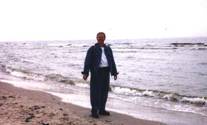
The photo is of the author, Rimgaudas P. Vidziunas, walking on the shores of the Baltic Sea. He was inspired to write poetry upon his first visit to Lithuanian in 1999
Today we are pleased to introduce you to Rimgaudas P. Vidziunas who came to the USA in 1949. Visited Lithuania 1999, 2002. BA History, University of Miami, Florida January 1970. Photographer for over 35 years.
Follow him on Facebook: "Photography by Rimgaudas". Currently residing Mesa, Arizona, USA.
Email: rvidziunas@yahoo.com
* * *
BALTIC BEACH DREAMS
I thought I heard you dream of Baltic beaches.
Walking in the evening sunset toward the cottage
That lies among the dunes.
The storm battered rain on our face, watching the storm end.
The return of the seagulls
Indicates the ending of the storm
And fly to greet us
As if saying all is well.
- Bookmark :
- Digg
- del.icio.us
- Stumbleupon
- Redit it
Poet Kazys Bradunas (1917-2009)
- Posted by - (0) Comment
![]()
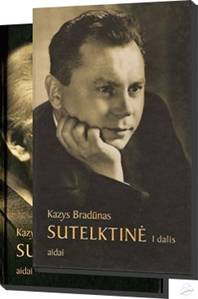
Poet Kazys Bradunas (1917-2009)
Today we are pleased to introduce you to Kazys Bradunas (1917-2009), a distinguished Lithuanian poet who, living in exile in the US during the Soviet occupation of his country, became one of the most active figures in preserving a national literary culture.
Bradunas was born in the village of Kirsai in southwestern Lithuania, coincidentally also the birthplace of the noted prewar woman poet Salomeja Neris. A year after his birth, in the turmoil following the Russian Revolution, Lithuania declared its independence. Bradunas began to write poetry while still a schoolboy. He studied Lithuanian language and literature at universities in Kaunas and Vilnius, and his first volume of verse, The Bells of Vilnius, was published in 1943. By then, however, Lithuania’s independence had been ended by successive Soviet and Nazi invasions. In 1944, when Soviet troops reoccupied Lithuania, Bradunas left the country, living in a camp for displaced persons in Germany before ultimately emigrating in 1949 to the US.
Resident in Baltimore and Chicago, Bradunas worked tirelessly to sustain a Lithuanian literature. He was a founder of the Zeme (“Earth”) movement, which sought to create a distinctively Lithuanian poetry, rooted in agriculture and local customs. He co-edited a Zeme anthology published in 1951.
In his own verse he drew on the rhythms of folk music and used descriptions of simple, specific objects to evoke Lithuania and its culture, focusing on its rural landscapes and its blend of pagan and Catholic heritage. Naturally, given the tragic national experience, his work was often elegiac: the title of his first published volume after leaving Lithuania, The Alien Bread (1945), aptly expressed the sense of dislocation experienced by the exile and captured in Bradunas’s poetry. Nevertheless, there was at times a note of triumph in verse which celebrated the flourishing of Lithuanian writers abroad:
Exiled poets are — desert cactuses.
They receive no moisture;
Sand surrounds them,
Yet they grow and bloom
Spiny red blossoms.
(translated by Jurgis Bradunas)
LET THE BLOSSOMS BLOOM
For Loreta and Jurgis
The river comes flowing
And brings with it a name.
Man comes forward
And brings with him a surname
A toponym appears:
A cross is constructed,
Smoke rises from a chimney.
In this way Suduva was born,
Absorbed into our hearts.
A daughter comes forward
And brings with her a fire.
A son comes forward
And brings with him bread.
At the shore of another world,
In the shade of another sky
And another tree
A table is constructed,
A loaf is sliced
Life begins.
Put your clasped hands
On the ancient table
And let the blossoms bloom.
(translated by Rita Dapkus)
SUN RITE
You brought in the sun for me
Past the smoky door jamb
Now I can hardly remember
How you knocked with a stone
At my cradle
While all around, like a dream you'd lost,
Awakened the forests of Rominta.
Then you put the sun for me
Like a transfigured breadloaf on the table
And the linen paled.
Then life's long
Ceremony began,
In which, like the censer's grains,
Smelled the blossoms of Rominta.
Where are you now, little sun,
Snuffed, carried out, buried?
Will I touch the earth with my forehead
Asking, can I
Knock with a stone
At your coffin
There, where late in the evening
Rustle the forests of Rominta.
(translated by Jonas Zdanys)
- Bookmark :
- Digg
- del.icio.us
- Stumbleupon
- Redit it
Professor Enrique Ferrer Corredor
- Posted by - (0) Comment
![]()
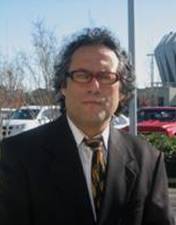
Enrique Ferrer Corredor
Today we are pleased to introduce you to Professor Enrique Ferrer Corredor, a Colombo-Venezuelan who loves Lithuania:
Professor Ferrer Corredor is an author and professor with a broad academic background. He divides his time between literature, economics, political science and his love for soccer. He is co-founder of Común Presencia (literary Magazine) and, founder and director of Papeles (Papers); he belonged to many writers' workshops in Colombia and Venezuela.
Ash of Moon, his first collection of poems, was published in 1994 and had two editions in 1998. In 2006, he published his book El público en escena (short stories). Also he has published many articles of literature and political science in international magazines. Today he is part of Word4word, a group of writers in Newport News, Virginia (USA).
Sand Time
for Inga Repšytė
Cling
to sand that goes down
between busy lips,
demonstrating
that time is measured
by the absent body
Flight
Girl, you have wasted your time with the rules;
prisons have closed their doors
and you stayed in your flight.
Roses are not amulets for the night,
cells are inhabited by Sade
where the guards come to the feast of freedom.
Geographies
My recent geography of your body speaks
Of words trapped in your skin
Of ruins and old residents
But it ignores
The music of your nights with no fate
Your ignorance against any defeat
Your fear of snakes
And a moon that sails in your belly.
Testament
My port
Is a wave
And ghosts
Eat at my table.
And if your eyes shut down
On the edge of the blade
Open my house's door
And cling to the abyss.
Instant
Two bodies
Plough the night
A flame
Hushes the fire.
- Bookmark :
- Digg
- del.icio.us
- Stumbleupon
- Redit it
KLAIPĖDA – the jewel in the amber crown
- Posted by - (2) Comment

Text: Aage Myhre
aage.myhre@VilNews.com
Klaipeda, the one and only Lithuanian coastline city, is called “the jewel in the amber crown,” a term that truly suits it, although to Lithuanians living inland the city is largely regarded as simply being the country’s port on the Baltic Sea.
Yet Klaipeda, which has a venerable history dating back to 1252, is far more than that. The sea, as a commercial port and as a replenishing source of food, sustains Klaipeda’s prosperity, but vistas of the sea add to the city’s beauty, and the scent of the sea that spices the air is a health-restoring elixir that quickens the step.
We fell in love with Klaipeda on a recent weekend, and we hope that what he found will inspire you to visit this modern, maritime, melting pot of over 150,000 inhabitants. It’s a destination that you are certain to enjoy.
The 300-kilometer, divided motorway from Vilnius to Klaipėda must be the easiest superhighway to drive in all of Europe, with very little traffic on the four lanes. So, if motoring from Vilnius, simply turn on your cruise control and enjoy a relaxing, three-hour trip through scenic rural views and undulating forest vistas on your way west. For those without wheels, there’s a deluxe, express bus that connects the two cities, and should you live abroad, you can fly from a number of European cities direct to Palanga, just thirty kilometers from Klaipėda.
It quickly struck us that the look of Klaipėda differs from the inland Lithuanian cities, as it shows the influence of Germanic architecture of the Hanseatic period, with many lattice-work buildings that reflect its Prussian past. Klaipėda was formerly called Memel, which is also the German name for the Nemunas River. In contrast, Klaipeda -- its present Lithuanian name -- reflects what the terrain of this city probably looked like on its founding some 760 years ago, for Klaipeda derives from the word “klaipė pėdas,” meaning “marshy footprint.”

|
|
|
|
|
On our first venture after arrival we strolled through Klaipeda’s Old Town, starting from Theatre Square that today very much functions as a market for local souvenirs and more. In the middle of this square stands a sculpture of Ann of Tharau, dedicated to the German poet Simon Dach, who was born and lived in Klaipėda and who fell deeply in love with this girl he was never to marry. The name of this square comes from the Drama Theatre to one side. Since the 18th century this theatre has continually played an important role in the cultural life of Klaipėda; in the 19th century its façade was reconstructed in a neo-classic style. Surrounding this square are fine restaurants, lively nightclubs, a casino, and a very delightful jazz club.
|
|
|
|
Nearby Aukštoji Street was our next destination; here we discovered the oldest buildings of the city, dating back to the 18th century. Some had latticework facades while others were of brick and stucco. Interspersed between these buildings are narrow alleyways with attractive courtyards, art galleries, cafés, and small boutiques. Browsing through these labyrinths in search of interesting objects of art could consume your day, and if that isn’t enough to keep the visitor occupied, the adjacent outdoor market provides another venue for lively bargaining. When shopping, think amber, keeping in mind that Klaipėda is considered to be the amber capital!

A stroll along the Dane River
|
|
|
Klaipeda’s Old Town connects to its New Town by two bridges over the river Dane. One unremarkable bridge was built in dreary Soviet times whereas the older, more interesting bridge has a beautiful metal framework in Jugend-style with metal lamps that are reflected in the river’s calm flow. On the Old Town side, at the river’s edge, are a series of restored warehouses, containing attractive cafés and shops, that end at the ferryboat quay. Other Klaipeda attractions include a spanking new cruise ship terminal and an old castle museum that displays artifacts from the 16th to 18th centuries, among them some armor made for a possible Swedish attack!

The ferry to the Curonian Spit takes but a few minutes; it is a “must-do” trip for every visitor. While crossing you can best see the endless row of dockside cranes and ships being built or repaired. This ferry gets you to the famous Maritime Museum (normally also to the Aquarium and Dolphinarium (that now is closed for renovation until 2012). You can also view some forty species of fish from Lithuanian rivers and lakes, along with more exotic examples of aquatic life -- tropical fish, seals, and penguins. This is the sole maritime museum on the eastern coast of the Baltic Sea and it provides great fun for youngsters and the young at heart!
While you are here, do not miss driving out to Melnragė Pier for an awesome view. From this vantage point, you can see the enormous port area and the magnificent sea in panorama. It’s especiallty impressive at evening when the orange sun sinks beneath the jade-colored waves. Should you happen to arrive when the sea is stormy, a walk on the shore right after the storm may be rewarded by finding pieces of amber – Lithuania’s gold – dislodged from depths of the sea.
|
|
|
So on your mark, get set, and go. Klaipėda and the Baltic Sea await your arrival!
Places to visit
|
1. The Maritime Museum 2. Aquarium and Dolphinarium (closed for renovation until 2012) 3. The Pier in Melnragė 4. The Old Town 5. The Castle Museum 6. Biržos Bridge 7. John’s Hill 8. The History Museum of Lithuania Minor 9. The Blacksmith’s Shop Museum 10. The Nature Museum 11. Klaipeda Picture Gallery
|
12. Klaipeda Art Exhibition House 13. Klaipeda Artists’ House 14. The Drama Theatre 15. The Musical Theatre 16. Pilies Theatre 17. The statue of Ann from Tharau 18. The Clock Museum 19. The Carillon 20. Sculpture Park 21. Klaipeda University
|

- Bookmark :
- Digg
- del.icio.us
- Stumbleupon
- Redit it
Friedricho Pasažas – the new wonder of Klaipėda
- Posted by - (2) Comment

Friedricho Pasažas (Friedrich Passageway, also called Friedrich Town) – is a truly unique oasis in downtown Klaipėda (located at Tiltų Street 26a, near the city’s old market).
According to historic documents, during the rule of Friedrich III, during the period of 19-29 June 1692, this place received official permission given by the citizens to be called Friedrichsstadt (Friedrich Town) based on an act from 1639. On 9 June 1707 Friedrichsstadt received its own coat of arms which on one side features a male figure with a wreath of oak leaves, whereas the other side contains the intertwined initials FR (Friedrich Rex – King Friedrich) under a crown.
It is in the Friedricho Pasažas that you might find yourself asking; “Is this really Lithuania?” Because once you enter this cozy and lively courtyard, you will feel as if you are in a world of its own, and you will soon find yourself ready to sit down and relax, try freshly prepared fish or meat dishes, exotic salads, pizzas, or simply sip some wine or coffee.
It was in 2006 that the new owner of the courtyard and the surrounding buildings began major re-construction works with the purpose to re-create the Friedrich town, create excellent restaurants and an ambience you hardly find anywhere else in Lithuania or neighbouring states.

The former courtyard between the houses has been turned into a true, unique oasis of restaurants and small shops.
Here are the restaurants you will be met by when entering the Friedrich Pasažas:
Friedrich Restaurant features Mediterranean dishes and selected wines. The olives are brought from Spain especially for this restaurant, also marinated right here. The restaurant also offers the world-renowned cured Spanish ham (jamon), as well as locally baked Greek bread and a variety of tasty appetizers and main dishes.
Gurman‘s Tea and Coffee House invites you to try more than a hundred types of the J. Balvočiūtės herbal teas. You can also bring the teas home. In addition, this place offers a great variety of coffees, freshly made pies, buns, sweets and salads.
Friedrich Wine Restaurant offers a great selection of wines from around the world. They pride themselves in offering exclusive wines, which you might save for very special occasions. If you are celebrating your birthday or any other fantastic happening, the staff will be able to recommend champagne or sparkling wines according to any taste. They will also be happy to suggest appetizers and cheese complementing the beverages. At the wine restaurant you will also find a wide variety of wine accessories.
Friedrich Pizzeria is a special place for all who love pizzas. They specialize in authentic Italian pizzas and work hard to offer the very best! Their main goal is to keep the authentic traditions and recipes of pizza making…
Friedrich Pub is a unique place, quite different from most other pubs in Lithuania, serving traditional dishes local to the Klaipeda region and old times Lithuania, like wild quail with mashed potatoes, “Memel” gingerbread and carrot cake...It is claimed that it’s only here you can get eel in wine sauce!
Fashion Cult is a designer store that sells stylish male and female outfits as well as accessories.
Ayurveda Massage and Rituals has just opened. Their specialty lies in the connection between the healing power of both touch and smell. During the massage sessions they use natural oils and herbs. A unique heat therapy is said to help in creating natural balance, strengthens immune system, and improves blood circulation.
Trapiche Steakhouse has only recently opened its doors. The restaurant chefs’ specialty are steaks prepared to perfection over the grill. They serve traditional beefsteaks but also grill pork, fish, game and lamb.
The owners of the Friedricho Pasažas are now planning to build a glass roof over the entire passageway. A project expected to be finished by the end of 2011, making this an oasis with summer mood and continued attractiveness all year around!

The bars and restaurants at Friedricho Pasažas are all nicely furnished and decorated.
Friedrich Guesthouse

A small hotel, with six elegant suites, is also connected to the Friedricho Pasažas.
Receptionist Monika Plataunaite takes well care of all guests.
The small Friedrich Hotel or Guesthouse at the Pasažas has only six rooms, or suites if to be more correct.
The hotel is beautifully decorated and furnished, providing excellent facilities for its guests. A pearl of its own!
- Bookmark :
- Digg
- del.icio.us
- Stumbleupon
- Redit it
History of Klaipėda
- Posted by - (2) Comment

The above illustration is from the web page
http://www.bork-on-line.de/Memel/index.htm
This web page includes very much interesting
information about Klaipeda (Memel) of those days!
In the early 1200s, the Teutonic Knights (‘Order of Brothers of the German House of Saint Mary in Jerusalem’) started building a castle in the Pilsāts Land of the Curonians and named it Memelburg; later the name was shortened to Memel.
From 1252-1923 and from 1939–1945, the town and city was officially named Memel. Due to political changes between 1923 and 1939, both names were in official use; since 1945 the Lithuanian name of Klaipėda is used.
The names Memelburg and Memel are found in most written sources from the 13th century onwards, while Klaipėda is found in Lithuania-related sources since the 15th century. The first time the city was mentioned as Caloypede in the letter of Vytautas in 1413, for the second time in the negotiation documents of 1420 as Klawppeda, and for the third time in the Treaty of Melno of 1422 as Cleupeda. According to Samogitian folk etymology, the name Klaipėda refers to the boggy terrain of the town (klaidyti=obstruct and pėda=foot). Most likely the name is of Curonian origin and means "even ground": „klais/ klait“ (flat, open, free) und “ped“ (sole of the foot, ground).
The lower reaches of the Neman River were named either *Mēmele or *Mēmela by Scalovians and local Curonian inhabitants. In the Latvian Curonian language it means mute, silent (memelis, mimelis, mēms). This name was adopted by speakers of German and also chosen for the new city founded further away at the lagoon.
A settlement of Baltic tribes in the territory of the present-day city is said to have existed in the region as early as the 7th century.
In the 1240s the Pope offered King Håkon IV of Norway the opportunity to conquer the peninsula of Sambia (the peninsula northwest of today’s Kaliningrad). However, following the personal acceptance of Christianity by Grand Duke Mindaugas of Lithuania, the Teutonic Knights and a group of crusaders from Lübeck moved into Sambia, founding unopposed a fort in 1252 recorded as Memele castrum (or Memelburg, "Memel Castle"). The fort's construction was completed in 1253 and Memel was garrisoned with troops of the Teutonic Order, administered by Deutschmeister Eberhard von Seyne. Documents for its foundation were signed by Eberhard and Bishop Heinrich von Lützelburg of Courland on 29 July 1252 and 1 August 1252.
Master Conrad von Thierberg used the fortress as a base for further campaigns along the Neman River and against Samogitia. Memel was unsuccessfully besieged by Sambians in 1255, and the scattered Sambians submitted by 1259. Memel was colonized by settlers from Holstein, Lübeck and Dortmund, hence Memel also being known at the time as Neu-Dortmund, or "New Dortmund". It became the main town of the Diocese of Curonia, with a cathedral and at least two parochial churches, but the development of the castle became the dominant priority. According to different sources, Memel received Lübeck city rights in 1254http://en.wikipedia.org/wiki/Klaip%C4%97da - cite_note-2 or 1258.
In the spring and summer of 1323, a Lithuanian army led by Gediminas came up the Neman and laid siege to the castle of Memel after conquering the town, and devastated Sambia, forcing the Order to sue for a truce in October. During the planning of a campaign against Samogitia, Memel's garrison of the Teutonic Order's Livonian branch was replaced with knights from the Prussian branch in 1328. Threats and attacks by Lithuanians greatly thwarted the town's development; the town and the castle were both sacked by Lithuanian tribes in 1379, while Samogitians attacked 800 workers rebuilding Memel in 1389.
Historical view of Memel, which is the old German name for the city.
The Treaty of Melno in 1422 stabilized the border between the Teutonic Order and the Grand Duchy of Lithuania for the next 501 years. The rebuilt town received Kulm law city rights in 1475. Memel remained part of what became Prussia and Germany; the border to Lithuania remained unchanged until 1919. It was one of the longest-lasting borders in Europe, and is referred to in the now-unsung first verse of the German national anthem, which describes borders of German-speaking lands: Von der Maas bis an die Memel, referring to the Meuse river in the West and Neman river in the East.
Duchy of Prussia.
Against the wishes of its governor and commander, Eric of Brunswick-Wolfenbüttel, Memel adopted Lutheranism after the conversion of Hohenzollern Margrave of Brandenburg Albert of Prussia and the creation of the Duchy of Prussia as a fief of Poland in 1525. It was the onset of a long period of prosperity for the city and port. It served as a port for neighbouring Lithuania, benefiting from its location near the mouth of the Neman, with wheat as a profitable export. The Duchy of Prussia was inherited by a relative, John Sigismund, the Hohenzollern prince-electors of the March of Brandenburg in 1618. Brandenburg-Prussia began active participation in regional policy, which affected the development of Memel. From 1629-1635, the town was occupied bySweden over several periods during the Polish-Swedish War of 1625-1629 and the Thirty Years' War.
After the Treaty of Königsberg in 1656 during the Northern Wars, Elector Frederick William opened Memel's harbor to Sweden, with whom the harbor's revenue was divided. Prussian independence from Poland and Sweden was affirmed in the Treaty of Olivain 1660.
The construction of a defence system around the entire town, initiated in 1627, noticeably changed its status and prospects. In November 1678 a small Swedish army invaded Prussian territory, but was unable to capture the fortress of Memel.
Kingdom of Prussia
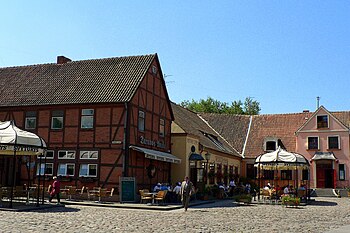
Timber frame buildings in the centre of Klaipėda.
By the beginning of the 18th century, Memel was one of the strongest fortresses (Memelfestung) in Prussia, and the town became part of the Kingdom of Prussia in 1701. Despite its fortifications, it was captured by Russian troops during the Seven Years' War in 1757. Consequently, from 1757–1762 the town, along with the rest of eastern Prussia, was dependent on the Russian Empire. After this war ended, the maintenance of the fortress was neglected, but the town's growth continued.
Memel became part of the province of East Prussia within the Kingdom of Prussia in 1773. In the second half of the 18th century Memel's lax customs and Riga's high duties enticed Englishtraders, who established the first industrial sawmills in the town. In 1784, 996 ships arrived in Memel, 500 of which were English. (In 1900 there was still an active English church in Memel, as well as a 'British Hotel'). The specialisation in wood manufacturing guaranteed Memel's merchants income and stability for more than a hundred years. During this era it also normalised its trade relations with Königsberg; regional instability had degraded relations since the 16th century.
Memel prospered during the second half of the 18th century by exporting timber to Great Britain for use by the Royal Navy. In 1792, 756 British ships visited the town to transport lumber from the Lithuanian forests near Memel. In 1800 its imports consisted chiefly of salt, iron and herrings; the exports, which greatly exceeded the imports, were corn, hemp, flax, and, particularly, timber. The 1815 Encyclopædia Britannica stated that Memel was "provided with the finest harbour in the Baltic".
During the Napoleonic Wars, Memel became the temporary capital of the Kingdom of Prussia. Between 1807 - 1808, the town was the residence of King Frederick William III, his consort Louise, his court, and the government. On 9 October 1807 the king signed a document in Memel, later called the October Edict, which abolished serfdom in Prussia. It originated the reforms of Karl Freiherr vom und zum Stein and Karl August von Hardenberg. The land around Memel suffered major economic setbacks under Napoleon Bonaparte's Continental System. During Napoleon's retreat from Moscow after the failed invasion of Russia in 1812, General Yorck refused Marshal MacDonald's orders to fortify Memel at Prussia's expense.

Ännchen von Tharau figure reconstruction in front of the theatre in honor of Simon Dach.
German Empire
After the unification of Germany into the German Empire in 1871, Memel became Germany's most northerly city.
The development of the town in the 19th century was influenced by the industrial revolution in Prussia and the attendant processes of urbanisation. Even though the population of Memel increased fourfold during the 19th century, and had risen to 21,470 by 1910, its pace of development lagged in comparison. The reasons for this were mostly political. Memel was the northernmost and easternmost city in Germany, and although the government was engaged in a very costly tree-planting exercise to stabilise the sand-dunes on the Curonian Spit, most of the financial infusions in the province of East Prussia were concentrated in Königsberg, the capital of the province. Some notable instances of the German infrastructure investments in the area included sandbar blasting and a new ship canal between Pillau and Königsberg, which enabled vessels of up to 6.5 m draughts to moor alongside the city, at a cost of 13 million marks.
Owing to the absence of heavy industry in the 1870s and 1880s, the population of Memel stagnated, although wood manufacturing persisted as the main industry. It remained the central point of the Baltic timber-trade. A British Consul was located in the town in 1800; in 1900 a British Vice-Consul was recorded there, as well as a Lloyd's Agent.

A narrow gauge railway station in 1920.
By 1900 steamer services had been established between Memel and Cranz (on the southern end of the Curonian Spit), and also between Memel and Tilsit. A main-line railway was built from Insterburg, the main East Prussian railway junction, to St. Petersburg via Eydtkuhnen, the Prussian frontier station. The Memel line also ran from Insterburg via Tilsit, where a further direct line connected with Königsberg, that crossed the 4 km wide Memel River Valley over three bridges before its arrival in Memel.
During the second half of the 19th century, Memel was a center for the publication of books printed in the Lithuanian language using the Latin alphabet - these publications were prohibited in the nearby Russian Empire. The books were then smuggled over the border into Lithuania.
The German 1910 census lists the Memel Territory population as 149,766, of whom 67,345 declared Lithuanian to be their first language. The Germans greatly predominated in the town and port of Memel as well as in other nearby villages; the Lithuanian population was predominant in the area's rural districts. (EB, 1938 Year Book, see map of languages)
Inter-war years

Marktstrasse with St. John's Church
Under the Treaty of Versailles after World War I, Klaipėda and the surrounding Klaipėda Region (Memel Territory) were detached from Germany and made a protectorate of the Entente States. The French became provisional administrators of the region until a more permanent solution could be worked out. Both Lithuania and Poland campaigned for their rights in the region. However, it seemed that the would become a free city, similar to the Free City of Danzig. Not waiting for an unfavorable decision, the Lithuanians decided to stage the Klaipėda Revolt, take the region by force, and present the Entente with fait accompli. The revolt was carried out in January 1923 while western Europe was distracted by the occupation of the Ruhr. The Germans tacitly supported the action, while the French offered only limited resistance.[5] The League of Nations protested the revolt, but accepted the transfer in February 1923. The formal Klaipėda Convention was signed in Paris on May 8, 1924, securing extensive autonomy for the region.
The annexation of the city had enormous consequences for the Lithuanian economy and foreign relations. The region subsequently accounted for up to 30% of the Lithuania's entire production. Between 70% and 80% of foreign trade passed through Klaipėda. The region, which represented only about 5% of Lithuania's territory, contained a third of its industry. The Weimar Germany, under Foreign Minister Gustav Stresemann, maintained normal relations with Lithuania. However, Nazi Germany desired to reacquire the region and tensions rose. Pro-German parties won clear supermajorities in all elections to the Klaipėda Parliament, which often antagonized with the Lithuanian-appointed Klaipėda Directorate. Lithuanian efforts to "re-Lithuanize" Prussian Lithuanians by promoting Lithuanian language, culture, education were often met with resistance from the locals. In 1932, a conflict between the Parliament and the Directorate had to be resolved by the Permanent Court of International Justice. In 1934–1935, the Lithuanians attempted to combat increasing Nazi influence in the region by arresting and prosecuting over 120 Nazi activists for the alleged plot to organize an anti-Lithuanian rebellion.[8] Despite rather harsh sentences, the defendants in the so-called Neumann–Sass case were soon released under pressure from Nazi Germany. The extensive autonomy guaranteed by the Klaipėda Convention prevented Lithuania from blocking the growing pro-German attitudes in the region.
As tensions in pre-war Europe continued to grow, it was expected that Germany would make a move against Lithuania to reacquire the region. German Foreign Minister Joachim von Ribbentrop of delivered an ultimatum to the Lithuanian Foreign Minister on 20 March 1939, demanding the surrender of Klaipėda. Lithuania, unable to secure international support for its cause, submitted to the ultimatum and, in exchange for the right to use the new harbour facilities as a Free Port, ceded the disputed region to Germany in the late evening of 22 March 1939. Adolf Hitler personally visited the harbour and delivered a speech to the city residents. This was Hitler's last territorial acquisition prior to World War II.
1945-Present

Litas commemorative coin dedicated to Klaipėda city.
During World War II, from the end of 1944 into 1945, as Allied victory appeared imminent, the inhabitants were evacuated as the fighting drew nearer. The nearly empty city was captured by the Soviet Red Army on 28 January 1945 with only about 50 remaining people. Those who remained were later expelled or killed. After the war the Memel Territory was incorporated into the Lithuanian SSR, marking the start of a new epoch in the history of the city.
The Soviets transformed Klaipėda, the foremost ice-free port in the Eastern Baltic, into the largest piscatorial-marine base in the European USSR. A gigantic shipyard, dockyards, and a fishing port were constructed. Subsequently, by the end of the 1950s, the population of the city had doubled its pre-war population, and by 1989 there were 203,000 inhabitants. In the aftermath of World War II almost all the new residents came to Klaipėda from Russia, Belarus, Ukraine and Lithuania. Initially the Russian-speakers dominated local government in the city, but after the death of Joseph Stalin, more people came to the city from the rest of Lithuania than from other Soviet republics and oblasts; Lithuanians then became its major ethnic group. Among Lithuanian cities with a population greater than 100,000, however, Klaipėda has the highest percentage of people whose native language is Russian.
Until the 1970s, Klaipėda was only important to the USSR for its economy, while cultural and religious activity was minimal and restricted. The developers of a Roman Catholic church (Maria, Queen of Peace, constructed 1957-1962) were arrested. The city began to develop cultural activities in the 1970s and 1980s, such as the introduction of the Sea Festival cultural tradition. Based on the Pedagogical University of Šiauliaiand the National Conservatory of Lithuania in Klaipėda, the University of Klaipėda was established in 1991. Klaipėda is now the home of a bilingual German-Lithuanian institution, the Hermann-Sudermann-Schule, as well as an English-language University, LCC International University.
Coat of arms
The coat of arms of Klaipėda is also used as coat of arms of Klaipėda city municipality. The modern version was created by the designer Kęstutis Mickevičius. The modern coat of arms was created by restoring old seals of the Memel city (analogous with those used in the years 1446, 1605 and 1618). It was affirmed on July 1, 1992.
Source: Wikipedia
- Bookmark :
- Digg
- del.icio.us
- Stumbleupon
- Redit it
Mare Suebicum
- Posted by - (2) Comment
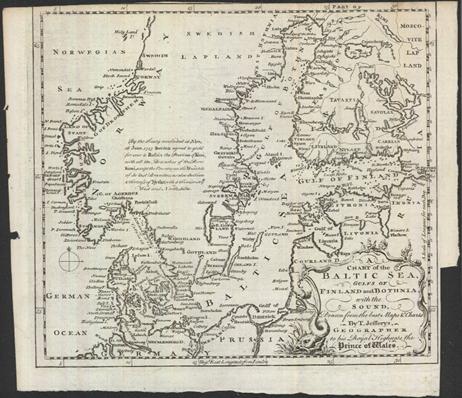
1748
"A Chart of the Baltic Sea, Gulfs of Finland and Bothnia, with the Sound, Drawn from the Best Maps & Charts by T. Jefferys, Geographer to His Royal Highness the Prince of Wales"
The Baltic Sea was known as the Mare Suebicum or Mare Sarmaticum at the time of the Roman Empire.
Since the Viking age, the Scandinavians have called it "the Eastern Lake", but Saxo Grammaticus recorded in Gesta Danorum an older name Gandvik, "-vik" being Old Norse for "bay", which implies that the Vikings correctly regarded it as an inlet of the sea.
In the early Middle Ages, Vikings of Scandinavia fought for power over the sea with Slavic Pomeranians. The Vikings used the rivers of Russia for trade routes, finding their way eventually all the way to Black Sea and southern Russia.
Finland and the Baltic states were the last in Europe to be converted into Christianity in the Northern Crusades: the former in the 12th century by the Swedes and the latter in the 13th century by the Germans. First the Livonian Brothers of the Sword and then the powerful German Teutonic Knights held the Baltic countries and fought with Danes and the Swedes, while the foundations of Russia were being laid in Novgorod.
Later on, the strongest economic force in Northern Europe became the Hanseatic league, which used the Baltic Sea to establish trade routes between its member cities. In the 16th and early 17th centuries, Poland, Denmark and Sweden fought wars for Dominium Maris Baltici (Ruling over the Baltic Sea). Eventually, it was the Swedish empire that virtually encompassed the Baltic Sea. In Sweden the sea was then referred to as Mare Nostrum Balticum (Our Baltic Sea). In the 18th century Russia and Prussia became the leading powers over the sea.
- Bookmark :
- Digg
- del.icio.us
- Stumbleupon
- Redit it
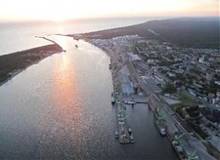
Klaipeda seaport authority received six tenders for an open procedure "Capital Dredging and Widening Works of Klaipeda State Seaport Navigation Channel", as the authority announced BC. The open procedure was announced on May 18, 2011. The tenders were submitted by foreign companies.
The project "Capital Dredging and Widening of Port Navigation Channel" is of vital importance to Klaipeda Port, as its representatives stated. In course of implementation of the project the width of the port will increase up to 150 meters from current 120 meters, and the depth relevantly will increase up to 14.5 meters as compared to present 13-13.5 meters.
Hence, the safety of gross tonnage vessel entering and leaving the Port and harbor manoeuvring will enhance in line with increased competitiveness of the port and its cargo handling capacity comparing to neighboring ports.
Such Port Navigation Channel parameters will result into favorable conditions to receive longer and wider postpanamax type vessels, the length of which reach up to 300-310 meters, and the width is nearly up to 40 meters.
Having signed the contract agreement on the capital dredging and widening of Klaipeda State Seaport navigation channel the winner of this open procedure shall execute all works within the period of 12 months (from the day of the contract – agreement has been concluded).
The intended volume of dredged soil in the I stage of works is 3 859 800 m3. The anticipated amount of excavated boulders in diameter from 0,8 to 1,5 metres is 440 units, the amount of boulders larger than 1,5 metres in diameter is 57 units.
The intended volume of dredged soil in the II stage of works is 655 200 m3 and the anticipated amount of excavated boulders in diameter from 0,8 to 1,5 metres is 50 units, the amount of boulders larger than 1,5 metres in diameter is 8 units.
The implementation of the project is envisaged in 2011-2012 using EU assistance funds (under the instrument No. VP2-5.2-SM-01 V of EU structural assistance priority 5 „Development of Trans – European Transport Network“).
Source: http://www.baltic-course.com
- Bookmark :
- Digg
- del.icio.us
- Stumbleupon
- Redit it
Fog rolls in on lighthouse
- Posted by - (0) Comment
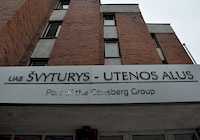
DARK DAYS: Svyturys brewery, in Klaipeda, faces labor strikes and a proposed marketing ban on alcohol.
KLAIPEDA - Lithuania’s market leading beer, Carlsberg Group-owned Svyturys Alus, or translated into English, ‘Lighthouse Beer,’ could be looking toward foggy futures ahead.
With company labor strikes in the pipeline for this month, set to disrupt production at their brewery in the city of Klaipeda, coupled with a proposed national alcohol advertising ban liable to come into force next year, the Danish-run brand has been on the front foot to come up with solutions.
A high percentage shift of the beer production, from Klaipeda to Utena, an industrial town in the northeast of the nation, second home to the joint manufacturer of the now named Svyturys-Utenos Alus, has allegedly left production volumes at Klaipeda’s brewery half that of three years prior. Disgruntled workers were questioning the reasons.
“As soon as the decision was made to transfer a part of production to Utena Brewery, the financial performance of the company deteriorated. An obvious tendency of the decrease in the company’s earnings, proportionate to the volume of the transferred production, can be observed,” claimed a spokesman on the European Commission sponsored Web site, beerworkers.org.
Read more at http://www.baltictimes.com/news/articles/29047/
- Bookmark :
- Digg
- del.icio.us
- Stumbleupon
- Redit it
VilNews e-magazine is published in Vilnius, Lithuania. Editor-in-Chief: Mr. Aage Myhre. Inquires to the editors: editor@VilNews.com.
Code of Ethics: See Section 2 – about VilNews. VilNews is not responsible for content on external links/web pages.
HOW TO ADVERTISE IN VILNEWS.
All content is copyrighted © 2011. UAB ‘VilNews’.

 Click on the buttons to open and read each of VilNews' 18 sub-sections
Click on the buttons to open and read each of VilNews' 18 sub-sections 





























.jpg)



